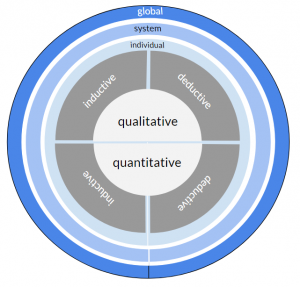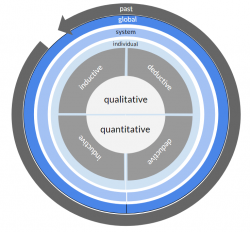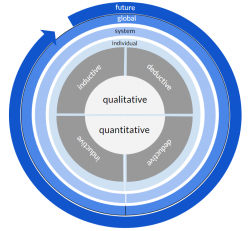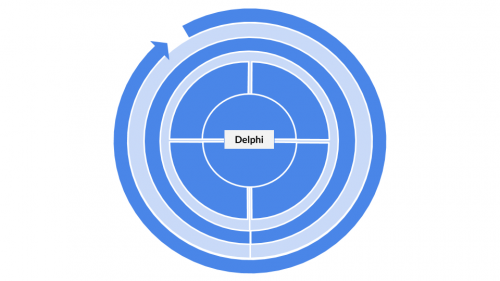Difference between revisions of "Sustainability Methods:About"
| (37 intermediate revisions by 2 users not shown) | |||
| Line 1: | Line 1: | ||
| + | __NOTITLE__ | ||
| + | __NOTOC__ | ||
== About this wiki == | == About this wiki == | ||
| + | The aim of the ''Sustainability Methods Wiki'' is to '''present and explain diverse scientific methods, terms and tools''' relevant to (Sustainability) Science and discuss underlying questions. It shall serve as '''a resource for students, researchers, teachers and any interested readers''' and tries to bridge the gap on how we approximate empirical knowledge, and how we ought to act based on this. Through an inclusive, reflexive and critical approach to the methodological canons, we try to contribute to solve the disciplinary slumber that defines much of post-modern science. | ||
| − | The Sustainability | + | === Sub-Wikis === |
| + | '''The Wiki is divided in four different sub-wikis:''' | ||
| + | * [[Courses]], which includes Wiki entries that parallel university courses, and in the future also stand-alone courses on specific topics. | ||
| + | * [[Methods]], where a range of scientific methods are presented and discussed that are crucial for Sustainability Science, and many more branches of science. | ||
| + | * [[Skills & Tools]], which lists helpful team and individual skills as well as tools that facilitate scientific and non-scientific work. | ||
| + | * [[Normativity of Methods]], which revolves around questions of Normativity in Science, and how science relates to the 'real world'. | ||
| + | === The Method Recommendation Tool === | ||
| + | The Method Recommendation Tool (MRT) is a digital tool designed to broaden your perspective on scientific methods. You select three scientific methods that you like and that you are familiar with. Based on their underlying Design Criteria (see below), the MRT creates a profile and then recommends five other scientific methods for each method that share traits with the selected ones, highlighting what you might be interested in. You can then read about these methods on the Wiki and broaden and / or sharpen your methdological profile. | ||
| − | === | + | === Design Criteria of Methods === |
| + | At the core of the Method entries on the Wiki lie the Design Criteria of Scientific Methods. If you want to read more about the idea behind it, please refer to the [[Design Criteria of Methods]] entry. In short, the idea is to challenge the prevalent assumption that each scientific discipline must be restricted to a narrow set of scientific methods. Instead, the Wiki suggests that methods should be selected according to the intended type of created knowledge. To show that methods are not bound to disciplines, '''the Wiki categorizes every presented scientific method according to four different design criteria:''' | ||
| + | <br/> | ||
| + | * [[:Category:Quantitative|Quantitative]] - [[:Category:Qualitative|Qualitative]] | ||
| + | * [[:Category:Inductive|Inductive]] - [[:Category:Deductive|Deductive]] | ||
| + | * Spatial scale: [[:Category:Individual|Individual]] - [[:Category:System|System]] - [[:Category:Global|Global]] | ||
| + | * Temporal scale: [[:Category:Past|Past]] - [[:Category:Present|Present]] - [[:Category:Future|Future]] | ||
| − | + | You can click on each category for more information and all the entries that belong to this category. | |
| − | + | <br/> | |
| − | |||
| − | |||
| − | |||
| − | |||
| − | |||
| − | |||
| − | |||
| − | |||
| − | [[File:ConceptPresent.png| | + | Each method fulfills one or more categories per design criterion. To highlight this, each method entry includes a visualisation of the method's categorization. The general visualisation is designed as follows: |
| + | [[File:ConceptPresent.png|300px|center|The Method Categorization Concept]] | ||
| + | <br> | ||
| + | This visualisation above refers to the majority of methods that focus on a slice of time - the present. | ||
| + | <br><br> | ||
| + | [[File:ConceptPast.png|250px|left|The Method Categorization Concept for Past Methods]] | ||
| + | [[File:ConceptFuture.png|250px|right|The Method Categorization Concept for Future Methods]] | ||
| − | + | <br><br> | |
| − | <br><br><br><br> | + | However, a range of methods exists that enable the researchers to investigate the past or the future. For these methods, the concept can be adapted to indicate a focus on the past (left) and a focus on the future (right) through one more circle. |
| + | <br><br><br><br><br><br> | ||
| − | [[File: | + | As an example, the ''Delphi'' method is both quantitative and qualitative, both inductive and deductive, looks at systems and into the future. |
| − | [[ | + | The respective visualisation therefore looks like this: |
| + | |||
| + | [[File:ConceptDelphi.png|500px|center|The categorization for the Delphi method]] | ||
| + | <br> | ||
| + | The categorization may serve as a guide to understand how methods are connected and to select methods for one's own research. Every reader may browse through the presented methods and learn about methods that never seemed fitting for one's own research, but maybe are. | ||
| + | |||
| + | == Frequently Asked Questions == | ||
| + | '''Who writes these entries?'''<br> | ||
| + | The entries are written by Prof. Dr. Henrik von Wehrden, Professor for scientific methods at Leuphana University, Lüneburg, and his team. The ''[[Table of Contributors]]'' shows all authors and contributors of all entries. In this entry, you can find some thoughts on the perspective taken in the Wiki entries: [[The "I" in this wiki]] | ||
| + | |||
| + | |||
| + | '''Can I write entries, too?'''<br> | ||
| + | Unfortunately, no. The Wiki is a collaborative project by Prof. Henrik von Wehrden and his team. In order to safeguard a coherent style and profound quality of Wiki entries, the Wiki is not open source. However, we are happy for any feedback on individual entries or the functionality of the website as well as questions that are not yet answered in the FAQ. If you want to contact us, please write an e-mail to sustainabilitywikifeedback [at] gmail [dot] com. | ||
| − | |||
| − | |||
| − | |||
| − | + | '''Should I create an account?'''<br> | |
| − | + | You can create an account on the top right of the page, but there are (yet) no advantages to this. Currently, no plans exist to implement any member-only features, so you do not need become a registered user. | |
| − | + | ||
| + | |||
| + | '''Are there more entries coming up?'''<br> | ||
| + | Yes! The Wiki is set up to be continuously extended with new entries, and structurally improved all the while. New entries can result from reader suggestions or ideas within the team. On the bottom of the [[Main Page|front page]], you can see the latest five entries that have been created. | ||
| − | [[ | + | '''How can I get in touch with you?'''<br> |
| + | We are happy about your feedback and questions! Please write an e-mail to sustainabilitywikifeedback [at] gmail [dot] com to get in contact. You can also follow us on [https://twitter.com/MethodsWiki twitter] (@MethodsWiki) to find interesting threads, insights and get in touch with us! | ||
Revision as of 18:47, 3 July 2023
About this wiki
The aim of the Sustainability Methods Wiki is to present and explain diverse scientific methods, terms and tools relevant to (Sustainability) Science and discuss underlying questions. It shall serve as a resource for students, researchers, teachers and any interested readers and tries to bridge the gap on how we approximate empirical knowledge, and how we ought to act based on this. Through an inclusive, reflexive and critical approach to the methodological canons, we try to contribute to solve the disciplinary slumber that defines much of post-modern science.
Sub-Wikis
The Wiki is divided in four different sub-wikis:
- Courses, which includes Wiki entries that parallel university courses, and in the future also stand-alone courses on specific topics.
- Methods, where a range of scientific methods are presented and discussed that are crucial for Sustainability Science, and many more branches of science.
- Skills & Tools, which lists helpful team and individual skills as well as tools that facilitate scientific and non-scientific work.
- Normativity of Methods, which revolves around questions of Normativity in Science, and how science relates to the 'real world'.
The Method Recommendation Tool
The Method Recommendation Tool (MRT) is a digital tool designed to broaden your perspective on scientific methods. You select three scientific methods that you like and that you are familiar with. Based on their underlying Design Criteria (see below), the MRT creates a profile and then recommends five other scientific methods for each method that share traits with the selected ones, highlighting what you might be interested in. You can then read about these methods on the Wiki and broaden and / or sharpen your methdological profile.
Design Criteria of Methods
At the core of the Method entries on the Wiki lie the Design Criteria of Scientific Methods. If you want to read more about the idea behind it, please refer to the Design Criteria of Methods entry. In short, the idea is to challenge the prevalent assumption that each scientific discipline must be restricted to a narrow set of scientific methods. Instead, the Wiki suggests that methods should be selected according to the intended type of created knowledge. To show that methods are not bound to disciplines, the Wiki categorizes every presented scientific method according to four different design criteria:
- Quantitative - Qualitative
- Inductive - Deductive
- Spatial scale: Individual - System - Global
- Temporal scale: Past - Present - Future
You can click on each category for more information and all the entries that belong to this category.
Each method fulfills one or more categories per design criterion. To highlight this, each method entry includes a visualisation of the method's categorization. The general visualisation is designed as follows:
This visualisation above refers to the majority of methods that focus on a slice of time - the present.
However, a range of methods exists that enable the researchers to investigate the past or the future. For these methods, the concept can be adapted to indicate a focus on the past (left) and a focus on the future (right) through one more circle.
As an example, the Delphi method is both quantitative and qualitative, both inductive and deductive, looks at systems and into the future. The respective visualisation therefore looks like this:
The categorization may serve as a guide to understand how methods are connected and to select methods for one's own research. Every reader may browse through the presented methods and learn about methods that never seemed fitting for one's own research, but maybe are.
Frequently Asked Questions
Who writes these entries?
The entries are written by Prof. Dr. Henrik von Wehrden, Professor for scientific methods at Leuphana University, Lüneburg, and his team. The Table of Contributors shows all authors and contributors of all entries. In this entry, you can find some thoughts on the perspective taken in the Wiki entries: The "I" in this wiki
Can I write entries, too?
Unfortunately, no. The Wiki is a collaborative project by Prof. Henrik von Wehrden and his team. In order to safeguard a coherent style and profound quality of Wiki entries, the Wiki is not open source. However, we are happy for any feedback on individual entries or the functionality of the website as well as questions that are not yet answered in the FAQ. If you want to contact us, please write an e-mail to sustainabilitywikifeedback [at] gmail [dot] com.
Should I create an account?
You can create an account on the top right of the page, but there are (yet) no advantages to this. Currently, no plans exist to implement any member-only features, so you do not need become a registered user.
Are there more entries coming up?
Yes! The Wiki is set up to be continuously extended with new entries, and structurally improved all the while. New entries can result from reader suggestions or ideas within the team. On the bottom of the front page, you can see the latest five entries that have been created.
How can I get in touch with you?
We are happy about your feedback and questions! Please write an e-mail to sustainabilitywikifeedback [at] gmail [dot] com to get in contact. You can also follow us on twitter (@MethodsWiki) to find interesting threads, insights and get in touch with us!



